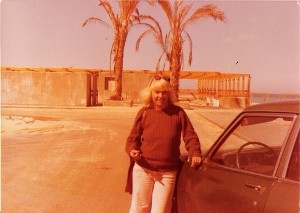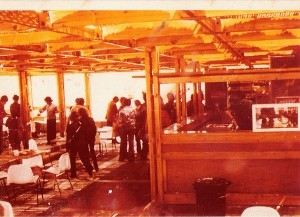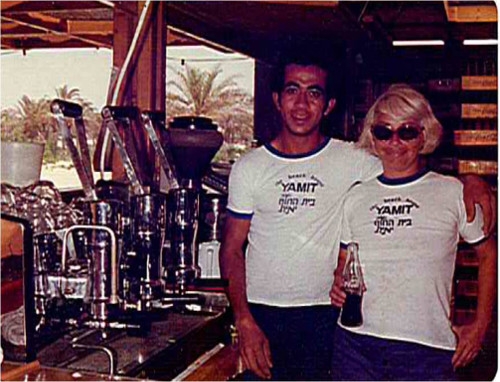Carole Rosenblatt: Yamit to Beer Sheva
Photos Courtesy Carole and David Rosenblatt
"I didn't leave Miami to live in Egypt!" Carole Rosenblatt, one of the original group who made aliyah to settle in Yamit, made headlines in 1978 with her incisive comment to an American reporter. Four years previously, Rosenblatt and about 30 other North Americans had accepted the State of Israel's invitation to make aliyah to help build Yamit, an idyllic new community on the Mediterranean in Sinai. They came, invested their money and their lives and then were evicted in 1982 when the Sinai was turned over to the Egyptians as part of the Camp David Accords. Today, 42 years later, the pain lingers just under the surface.
PREPARATION
"I was 34, a divorcee with three kids, ages 10, 12 and 14. I'd never been to Israel. I didn't know the language," Rosenblatt laughs. "I was incredibly naïve. I'd always wanted to visit Israel, but as a young family, we never had the money. So after my divorce, I went to the shaliah [emissary] who put me off for a year and a half, until Yamit came along. A new development city was being opened, he said, one that would welcome all kinds of people - singles, divorcees and families. "I went to an organizational meeting, met people and became friends with several. Another meeting was held in Philadelphia during the winter of 1973-74. 'Who wants to go this summer?' they asked. I hadn't really been serious about aliyah. I had a home with a swimming pool, and all kinds of obligations, including an upcoming barmitzvah. Then they showed photos. The Sinai was incredible - blue water, white sand, palm trees. I raised my hand. 'I'll go!' That was it."
ARRIVAL
"I came with $3,000 and three kids, and didn't know enough to be worried. We arrived at the absorption center in Beer Sheva at 7:30 a.m. on August 1, 1974. Part of the garin [group] was already there, and someone rushed up and said, "The Jewish Agency is coming to take us out to see the site. Do you want to go?" We dumped our bags and got on the bus. Nothing at all was built there yet, just that exquisite beach, blue water and white sand."
SETTLING IN
"We spent 14 months at the absorption center learning Hebrew and helping plan the new community. I'd been an extremely efficient secretary with great initiative, so I ended up as the group's representative to the government, working with people like Moshe Dayan, Arik Sharon, Menachem Begin and Yitzhak Shamir. I worked long hours, and basically they only paid for my gas.
DAILY LIFE
Rosenblatt, with her family background in food service, found a young Israeli partner and opened what became the local hangout. "The Beach House became very successful. I courted tour guides, because they'd bring their buses in, but of course when several buses arrived it would be pure chaos. The tour guides learned to pitch in, helping to get everyone served. I loved the tourists and have always been a people's person. Sometimes I'd lay it on a little thick. They'd ask about housing, and I'd tell them it all had to be bullet-proof. That wasn't true, but they liked the stories. "Yamit didn't seem dangerous to us, but the government built a perimeter fence and we all did guard duty. I became friends with my Arab employees from Rafah, and we frequently visited each other's houses. At first, we weren't allowed to remain open at night, when army trackers would walk the beaches, checking for footprints, to see if anyone was sneaking in. But we knew we could make a lot of money at night - there were about 500 families in the area, and no place else to go." One day we made up posters: One free drink and belly dancing at the Beach House Friday night! We put the posters right outside the government offices, so of course they were upset. 'You can't open at night! We'll arrest you!' So I said, 'Are you going to arrest the 500 families who come, too?' They sent a big shot to talk to me, and he was reasonable. He told me I really shouldn't have done it, but because we'd done the advertising, they'd let us open one night only and would send soldiers to protect us. So we stayed open that Friday - it was packed. Everyone came; the soldiers had a ball. From then on, we were open every night. No one said a word."
CHALLENGES
"When we learned Yamit was going to be turned over to Egypt, we were stunned. All along we'd been assured that wouldn't happen, and then it did. The government treated us very unfairly. They paid off several people at first, just to get them to leave. But for those of us who had established businesses, the situation was far more complicated. I had the parking concession at the beach, and had prepaid the government for it. When the closure hit, they refused to pay compensation saying I couldn't prove that the concession would be renewed - it was insane. I sued them, and lost. I wouldn't leave, so they turned off my electricity, water, phones and sent someone to arrest me. They did this so often. I'd walk into court, and the judge would say, 'What did you do now?' I wasn't about to go quietly. "The bureaucracy was out of all proportion, but the hardest part was the way the Israelis treated us. Everyone assumed we'd planned to come to Yamit to be paid to leave. Afterward, they thought we were all rich - when landlords heard 'Yamit,' the rent went up. For years, my kids refused to admit they were from Yamit. The assumption was that we'd scammed the government. The truth was exactly the opposite."
THE REST OF THE STORY
After leaving Yamit, Rosenblatt opened a dairy restaurant in Beer Sheva that became so successful she was forced to sell it. "I was working 17-18 hour days and on the verge of collapse. Then I made a big mistake by purchasing a 5,000-dunam sheep ranch, and lived on the income for five years, with no electricity. I finally had to sell my home in Omer to pay off the debt so I could get rid of it. Then I bought a run-down house in Beersheba in a neighborhood near my work. I figured if I had to sell my car, too, I could at least walk to work." That didn't happen, and today the completely remodeled home has one of Beer Sheva's most exquisite private gardens, a wonderland of greenery and blooming plants, dotted with shady nooks for barbecues or relaxing. Rosenblatt then worked for 15 years as an expeditor of shipments for kibbutz factories which entailed long and hectic days. "As clever as I had been at fooling the government, what I didn't realize was that most Israelis make sure they have a job with pension benefits. Since retiring, I have managed to travel and tour many countries including several trips to visit family in the United States".
REWARDS
"My major motivation in coming here was my kids. I could see that had I stayed in the States, my kids would not have married Jews. That was successful - very successful. I have 17 Jewish grandchildren and 15 great-grandchildren, plus another 6 'grandchildren' from another girl I raised. Even so, I sometimes wonder what life would have been like if I hadn't come."
Today, Carole is the dynamic and ever optimistic Chairman of the ESRA branch in Beer Sheva. Her home is sometimes like Grand Central Station where her extended family and friends love to congregate and enjoy her warm hospitality not to mention the constant patter of little feet from her great-grandchildren who love to turn her home upside down while her two dogs bark.











Comments